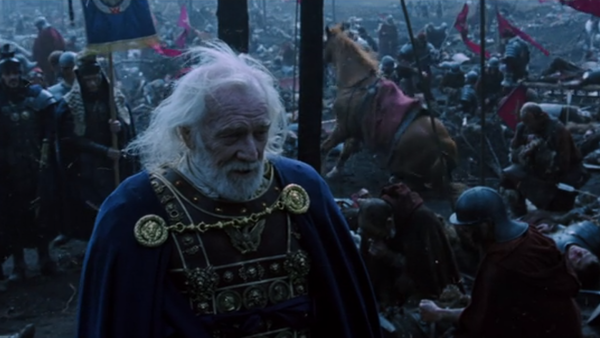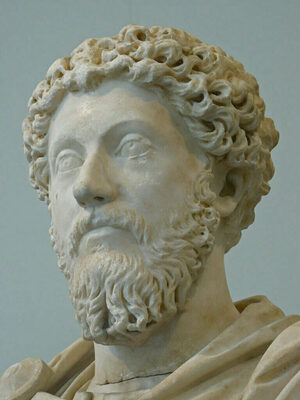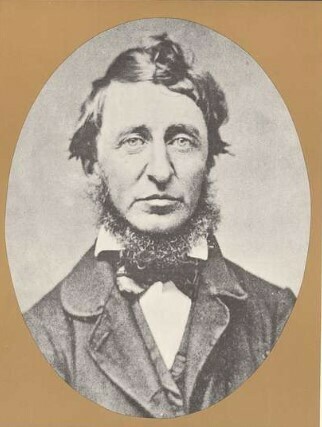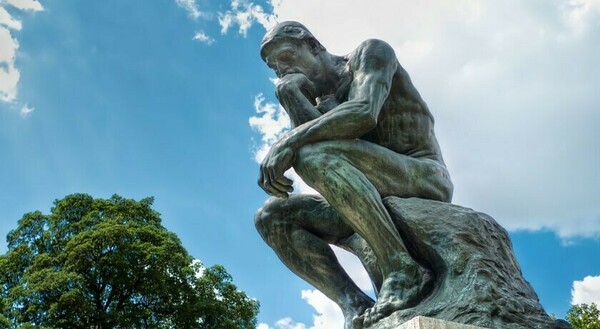What role does contemplation play in the good life?
The World of Marcus Aurelius and Henry David Thoreau
A Warring Emperor
|
You are the son of a distinguished Roman politician, but your father died when you were just 3 years old. Hand-picked at a young age by the Emperor to one day succeed him, you have been groomed for the throne your whole life. You are handed the reins to the Roman army first, and then to all of Rome. General, High Priest, Emperor—titles you never wanted, but were bound by duty and destiny to accept. Death was never far from your family. Your mother and sister died far too young, along with nearly half of your 13 children who didn’t live to see adolesence. You scarcely knew their faces, for duty always came before family. 
Now, you ride on horseback across the front lines of your Roman legion preparing for battle with the Germanic hordes. This is just one of hundreds of battles you have fought over the past several years, and will continue to fight for several years to come. The invaders are far less disciplined and possess far less advanced weaponry, but they make up for that in sheer aggression and seemingly inexhaustible numbers. As you survey your troops, the greatest fighting force the Western world has ever known, every passing face bows in reverence and subservience. To you. For you. Their lives, their fortunes, their lands, their very spirits, are at your service and under your protection. |
Marcus Aurelius
 |
Discontent in the Industrial Age

“The mass of men lead lives of quiet desperation. What is called resignation is confirmed desperation. From the desperate city you go into the desperate country, and have to console yourself with the bravery of minks and muskrats.”
“But lo! Men have become the tools of their tools. We now no longer camp as for a night, but have settled down on the earth and forgotten heaven.”
“To make a railroad round the world available to all mankind is equivalent to grading the whole surface of the planet. Men have an indistinct notion that if they keep up this activity of joint stocks and spades long enough all will at length ride somewhere, in next to no time, and for nothing; but though a crowd rushes to the depot, and the conductor shouts 'All aboard!' when the smoke is blown away and the vapor condensed, it will be perceived that a few are riding, but the rest are run over,—and it will be called, and will be, 'A melancholy accident.'"
Henry David Thoreau
 |
The Vita Contemplativa
|
In response to the problems described above, both Marcus and Thoreau turned to the vita contemplativa, the contemplative life. While some philosophers, like Dr. King, emphasize the role of action in the good life, others highlight the importance of detached contemplation, taking time to reflect, and living deliberately. Contrary to what you might think, these two are not opposites but rather two sides of one coin. After all, it’s not like Dr. King advocated for acting without thinking or reflecting. Likewise, proponents of the contemplative life do not argue for a lifetime of isolated reflection on life’s mysteries. Marcus Aurelius was a Roman emperor who did most of his writing while waging war across Europe, and Thoreau was a fierce advocate of civil disobedience and abolition, even serving as a conductor on the Underground Railroad. Instead, proponents of the contemplative life generally believe that:
Many thinkers throughout history have advocated for these ideas. We will focus on two contemplative approaches to the good life: Stoicism and Transcendentalism. StoicismStoicism is a philosophical system developed in Greece around the third century BC. It flourished in Rome, practically becoming something of an unofficial state religion for a period of time, with many pre-Christian politicians identifying as Stoics. Stoicism remains a popular philosophy today, as evidenced by podcasts like The Daily Stoic. Broadly speaking, Stoics advocate for aligning oneself with the universal laws of nature, cultivating virtues in order to overcome obstacles, reacting appropriately to suffering and misfortune, and generally practicing self-control and self-discipline. TranscendentalismTranscendentalism is a school of thought coming out of America in the early 1800s. Its basic tenets are (1) a belief in personal revelation and intuition as the best sources of knowledge, as opposed to reason, sense-experience, or tradition, and (2) an emphasis on the beauty, healing power, and divine character of nature. As a result of these beliefs, transcendentalists were often highly individualistic and highly skeptical of traditions and societal institutions. Many, like Thoreau, became staunch supporters of abolition, women’s rights, and economic self-reliance. |
Goal #1: Connecting with the Universal
Focus on what matters
|
Let’s flesh out in a bit more detail what the goals of the contemplative life are for Marcus and Thoreau. The first goal they share is to be less concerned with fleeting or "unimportant" aspects of life and focus instead on eternal truths. For Marcus, this meant aligning yourself with divine Providence, which the Stoics also called the Logos ("Reason", "Word"). For Thoreau, it meant simplifying your life to the bare minimum of material sustenance so that you can focus your attention on contemplation of eternal truths. |
Marcus Aurelius
Alignment with Divine Providence

The particular effects in the world are all wrought by one intelligent Nature. This universal cause has no foreign assistant, no interloping principle, either without or within it. (VI.9)
The world is either a medley of atoms that now intermingle and now are scattered apart, or else it is a unity under the laws of order and providence. If the first, what should I stay for, where nature is in such a chaos, and things are so blindly jumbled together? Why do I care for anything else than to return to the element of earth as soon as may be? Why should I give myself any trouble? Let me do what I will, my elements will be scattered. But if there is a Providence, then I adore the great Governor of the world, and am easy and of good cheer in the prospect of protection. (VI.10)
If the gods have decreed anything concerning me or my business, they have decreed my advantage. For it is absurd to suppose that they are mistaken in their measures, or not benevolent in their design. For to what purpose should they intend me any harm? What would themselves, or the universe, the special object of their providence, gain by it? And why, then, should I not be contented with whatever happens as a consequence of the universal whole? (VI.44)
We ought to live with the gods. This is done by him who always exhibits a soul contented with the appointments of Providence, and obeys the orders of that divinity which is his deputy and ruler, and the offspring of God. Now this divine authority is neither more nor less than that soul and reason which every man possesses. (V.27)
| Here, Marcus says that we ought to align ourselves with the divine laws that govern the universe because they are both inescapable and beneficial for us. And we have a built-in way to do this: follow our reason. Our rational minds (the "logos" in each of us) harmonize with the perfect Mind behind the universe as a whole (the divine Logos)—as long as we do not allow them to be clouded by irrational cravings or vices. |
Everything is Connected
All parts of the universe are interwoven and tied together with a sacred bond. And no one thing is foreign or unrelated to another. This general connection gives unity and ornament to the world. For the world, take it altogether, is but one. There is but one sort of matter to make it of; one God that pervades it; and one law to guide it, the common reason of all rational beings; and one truth; if, indeed, beings of the same kind, and endued with the same reason, have one and the same perfection. (VII.9)
The soul of the universe is of a social disposition. For this reason it has made the lower part of the creation for the sake of the higher. And as for those beings of the higher rank, it has bound them to each other. You see how admirably things are ranged and subordinated according to the dignity of their kind, and cemented together in mutual harmony. (V.30)
| Not only does divine Providence guide our lives, it guides everything in the universe. Everything is united by this common substance and purpose, and all things have their place. There may be naturally inferior or superior beings, but everything has its role to play in the cosmos as a whole, so we are all dependent upon each other and unified. |
Thoreau
Shams and delusions are esteemed for soundest truths, while reality is fabulous. If men would steadily observe realities only, and not allow themselves to be deluded, life, to compare it with such things as we know, would be like a fairy tale and the Arabian Nights’ Entertainments. If we respected only what is inevitable and has a right to be, music and poetry would resound along the streets. When we are unhurried and wise, we perceive that only great and worthy things have any permanent and absolute existence,—that petty fears and petty pleasures are but the shadow of the reality. This is always exhilarating and sublime. By closing the eyes and slumbering, and consenting to be deceived by shows, men establish and confirm their daily life of routine and habit everywhere, which still is built on purely illusory foundations. Children, who play life, discern its true law and relations more clearly than men, who fail to live it worthily, but who think that they are wiser by experience, that is, by failure.
Men esteem truth remote, in the outskirts of the system, behind the farthest star, before Adam and after the last man. In eternity there is indeed something true and sublime. But all these times and places and occasions are now and here. God himself culminates in the present moment, and will never be more divine in the lapse of all the ages. And we are enabled to apprehend at all what is sublime and noble only by the perpetual instilling and drenching of the reality that surrounds us. The universe constantly and obediently answers to our conceptions; whether we travel fast or slow, the track is laid for us. Let us spend our lives in conceiving then.
Let us spend one day as deliberately as Nature, and not be thrown off the track by every nutshell and mosquito’s wing that falls on the rails… Why should we knock under and go with the stream? … If the engine whistles, let it whistle till it is hoarse for its pains. If the bell rings, why should we run? We will consider what kind of music they are like. Let us settle ourselves, and work and wedge our feet downward through the mud and slush of opinion, and prejudice, and tradition, and delusion, and appearance, that alluvion which covers the globe, through Paris and London, through New York and Boston and Concord, through church and state, through poetry and philosophy and religion, till we come to a hard bottom and rocks in place, which we can call reality, and say, This is, and no mistake; and then begin, having a point d’appui, below freshet and frost and fire, a place where you might found a wall or a state, or set a lamp-post safely, or perhaps a gauge, not a Nilometer, but a Realometer, that future ages might know how deep a freshet of shams and appearances had gathered from time to time… Be it life or death, we crave only reality. If we are really dying, let us hear the rattle in our throats and feel cold in the extremities; if we are alive, let us go about our business.
Time is but the stream I go a-fishing in.
I drink at it; but while I drink I see the sandy bottom and detect how shallow it is. Its thin current slides away, but eternity remains.

|
This excerpt, from the section “Where I Lived, and What I Lived For,” details in beautiful, folksy prose Thoreau’s goal in the life of contemplation. In short, it is to seek eternal truths in every moment of the present. People, he says, are so caught up in their everyday tasks, opinions, traditions, habits and routines that they lose sight of reality itself. By shifting our attention away from these impermanent and, in the long run, inconsequential matters, we can return our focus to the world around us, and the eternal truths it displays to us. To use his fishing metaphor, time is a river rushing forward, and too many people are focused on where it’s going (their future plans), what other boats are doing (opinions of others), or how much time they have left to catch fish (productively using time to increase wealth). What they should be focused on is fishing and drinking the water (the actual essential activity of their lives), which would then allow them to see how shallow the stream is (how fleeting and unimportant life achievements and material gain are), and instead see the bottom of the river (the permanent, eternal truths of life). And how do we access these eternal truths? Well, one way he has described already: Being present in every moment and trusting your natural instincts and intuitions. Another way is through reason: |
The intellect is a cleaver; it discerns and rifts its way into the secret of things. I do not wish to be any more busy with my hands than is necessary. My head is hands and feet. I feel all my best faculties concentrated in it. My instinct tells me that my head is an organ for burrowing, as some creatures use their snout and fore-paws, and with it I would mine and burrow my way through these hills. I think that the richest vein is somewhere hereabouts; so by the divining-rod and thin rising vapors I judge; and here I will begin to mine.
Goal #2: Dying Well
Dying Well
| In addition to reminding himself not to get bogged down in the details and politics of running an empire, Marcus Aurelius thought a lot about death. He was deeply concerned with dying well, as was Thoreau. Here’s how each philosopher conceived of death and dying. |
Marcus Aurelius
Use philosophy to overcome it
The extent of human life is but a point; its substance is in perpetual flux, its perceptions dim, and the whole composition of the body tending to corruption. The soul is but a whirl, fortune not to be guessed at, and fame undiscerning – in a word, that which belongs to the body is a flowing river, and what the soul has is but dream and bubble. Life is but a campaign, or course of travels, and after-fame is oblivion. What is it, then, that will stick by a man? Why, nothing but philosophy. Now, this consists in keeping the divinity within us from injury and disgrace, superior to pleasure and pain, doing nothing at random, without any dissembling and pretence, and independent of the motions of another. Farther, philosophy brings the mind to take things as they fall, and acquiesce in their distribution, inasmuch as all events proceed from the same cause with itself; and, above all, to have an easy prospect of death, as being nothing more than a dissolving of the elements of which each thing is composed. Now, if the elements themselves are never the worse for running off one into another, what if they should all change and be dissolved? Why should any man be concerned at the consequence? All this is but Nature’s method; now, Nature never does any mischief. (II.17)
Keep it always in your mind, but don't fear it
Do not act as if you had ten thousand years to throw away. Death stands at your elbow. Be good for something, while you live and it is in your power. (IV.17)
Consider what death will make of you, both as to body and mind, recollect the shortness of life, the immeasurable extent of time, both past and future, and how slenderly all things are put together. (XII. 7)
He that dreads death is either afraid that his senses will be extinguished or altered. Now, if you have no faculties, you will have no feeling. But if you have new perceptions, you will be another creature, and will not cease to live. (VIII.58)
Thoreau
I went to the woods because I wished to live deliberately, to front only the essential facts of life, and see if I could not learn what it had to teach, and not, when I came to die, discover that I had not lived.
I did not wish to live what was not life, living is so dear; nor did I wish to practise resignation, unless it was quite necessary. I wanted to live deep and suck out all the marrow of life, to live so sturdily and Spartan-like as to put to rout all that was not life, to cut a broad swath and shave close, to drive life into a corner, and reduce it to its lowest terms, and, if it proved to be mean, why then to get the whole and genuine meanness of it, and publish its meanness to the world; or if it were sublime, to know it by experience, and be able to give a true account of it in my next excursion. For most men, it appears to me, are in a strange uncertainty about it, whether it is of the devil or of God, and have somewhat hastily concluded that it is the chief end of man here to “glorify God and enjoy him forever.”
| By saying that he hopes to live before dying, Thoreau implies that many people are not truly "alive"—they’re not living as humans ought to live. Unlike Marcus, Thoreau does seem to fear death, or at least fear that he was so distracted by trivialities during his life that his death may come before he has ever truly lived. |
Diverging Strategies
Self-Control vs. Retreat
| We have seen how Marcus and Thoreau share similar goals in choosing the contemplative life: They both seek to let go of the temporary, the material, and the unimportant in order to focus on eternal and universal goods, and they both seek to be at peace with dying. Their strategies for reaching these goals, however, differ quite a bit (although both point to reason as a guiding force). |
Marcus Aurelius
Compassion
Just as connection creates sympathy in the members of the body, so relation of nature does the same thing among rational beings. For though separate in space, they seem all made to co-operate with each other. This thought will be more intelligible and affecting if you frequently consider yourself as a member of the rational system. But if you reckon yourself only a part, you do not yet love mankind with all your heart. A generous action does not yet delight you from conviction; you do a good office merely for fashion and decency, but not as if it were really a kindness to yourself. (VII.13)
It is the privilege of human nature to love those that disoblige us. To practice this, you must consider that the offending party is of kin to you, that ignorance is the cause of the misbehavior, and the fault is involuntary, that you will both of you quickly be in your graves; but especially consider that you have received no harm by the injury, for your mind is never the worse for it. (VII.22)
| Because we are all connected by Divine Providence, harm to another is like harm to oneself. If we always keep our interconnectedness in mind, then we will naturally be more loving and compassionate. Marcus says we should even love those that offend us. |
Gratitude
| Marus also goes out of his way to express gratitude to all those who had played a role in shaping the man he was at the time of writing. The entirety of Book I is a list of influences on his life and what lessons he learned from them. Here are a few: |
The example of my grandfather Verus gave me a good disposition, not prone to anger. (I.1)
From Diognetus, to shun vain pursuits, not to be led away with the impostures of wizards and soothsayers, who pretend they can discharge evil spirits… This Diognetus taught me to bear freedom and plain-dealing in others, and apply myself to philosophy. He also procured me the instruction of Bacchius, Tandasis, and Marcianus. He likewise put me upon improving myself by writing dialogues when I was a boy; prevailed with me to prefer a couch covered with hides to a bed of state; and reconciled me to other like rigours of the Grecian discipline. (I.6)
The philosopher Sextus recommended good-humour to me, and showed me the pattern of a household governed in a fatherly manner. He also bade me make nature and reason my rule to live by. By his precedent I was instructed to appear with an unaffected gravity, to study the temper and circumstances of my friends in order to oblige them. (I.9)
Self-Control
| Above all for Marcus (and all Stoics) was the practice of self-control. Much of the Meditations are devoted to reminders to avoid seeking fame or wealth, overreacting to setbacks or ther criticism of others, and worrying about things that are beyond your control. In general, stoics preach ‘mind over matter,’ accepting what you can’t change, and humility in all pursuits. Here are a few of the many passages where Aurelius touches on these subjects. |

Toss me into what climate or state you please, for all that, I will keep my divine part content, if it can but exist, and act in accordance with its nature. What! Is this misadventure big enough to ruffle my mind and make it deteriorate? To make it mean, craving, and servile, and frightened; what is there that can justify such disorders? (VIII.45)
If anything external vexes you, take notice that it is not the thing which disturbs you, but your notion about it, which notion you may dismiss at once if you please. But if the condition of your mind displease you, who should hinder you from rectifying your opinion? Farther, if you are disturbed because you are not active in the discharge of your duty, your way is rather to do something than to grieve at your own omission. But you are under some insuperable difficulty; then never vex yourself about the matter, for you have nothing to answer for. (VIII.47)
Concerning those that offend, consider in the first place, the relation you stand in towards men, and that we are all made for each other… Do not forget you are like the rest of the world, and faulty yourself in a great many instances… When you are most angry and vexed, remember that human life lasts but a moment, and that we shall all of us very quickly be laid in our graves… Consider that it is not other people’s actions which disturb us, but only our own opinions about them… Consider that our anger and impatience often prove much more mischievous than the things about which we are angry or impatient… That gentleness is invincible, provided it is of the right stamp, without anything of hypocrisy or malice. (XI.18
Thoreau
Be healed by nature
When first I took up my abode in the woods, that is, began to spend my nights as well as days there, which, by accident, was on Independence Day, or the Fourth of July, 1845, my house was not finished for winter, but was merely a defence against the rain, without plastering or chimney, the walls being of rough, weather-stained boards, with wide chinks, which made it cool at night. The upright white hewn studs and freshly planed door and window casings gave it a clean and airy look, especially in the morning, when its timbers were saturated with dew, so that I fancied that by noon some sweet gum would exude from them. To my imagination it retained throughout the day more or less of this auroral character, reminding me of a certain house on a mountain which I had visited the year before. This was an airy and unplastered cabin, fit to entertain a travelling god, and where a goddess might trail her garments. The winds which passed over my dwelling were such as sweep over the ridges of mountains, bearing the broken strains, or celestial parts only, of terrestrial music. The morning wind forever blows, the poem of creation is uninterrupted; but few are the ears that hear it.
Olympus is but the outside of the earth everywhere.
| Thoreau believed strongly in the healing power of nature and the outdoors, even comparing it here to the realm of the gods. He also spoke of the value of getting lost: |
It is a surprising and memorable, as well as valuable experience, to be lost in the woods any time. Not till we are lost, in other words not till we have lost the world, do we begin to find ourselves, and realize where we are and the infinite extent of our relations.
| It is because of this that Thoreau spends much of Walden simply describing his environment in some of the most beautiful prose you will find in nonfiction literature. We will not copy the entire passages here, but we encourage you to read the passages where Thoreau describes in exquisite detail the battle of two warring armies of ants, the game he played with a loon in Walden Pond, or the layers of ice on Walden Pond in winter. Reading them is a meditative, contemplative, healing exercise in itself. |
Total retreat
| Also partly due to his love of wilderness, Thoreau advocated for a complete retreat from society and any form of material temptation whatsoever, at least for some time in your life. This is in stark contrast to Marcus Aurelius, who sought connection with others and self-control while firmly engaged in the welfare of the community. Thoreau at times seems incapable of self-control, and chooses instead to completely retreat from other people. |

But for my part, I preferred the solitary dwelling. Moreover, it will commonly be cheaper to build the whole yourself than to convince another of the advantage of the common wall; and when you have done this, the common partition, to be much cheaper, must be a thin one, and that other may prove a bad neighbor, and also not keep his side in repair. The only coöperation which is commonly possible is exceedingly partial and superficial; and what little true coöperation there is, is as if it were not, being a harmony inaudible to men.
I confess that I have hitherto indulged very little in philanthropic enterprises. I have made some sacrifices to a sense of duty, … As for Doing-good, that is one of the professions which are full. Moreover, I have tried it fairly, and, strange as it may seem, am satisfied that it does not agree with my constitution.
| Not only does Thoreau retreat from people, he retreats from all material temptations. While he admits that some level of food, shelter, clothing, and fuel are necessary for human survival, he seems to wish he could even be independent of these as well. |
I believe that every man who has ever been earnest to preserve his higher or poetic faculties in the best condition has been particularly inclined to abstain from animal food, and from much food of any kind.
The summer, in some climates, makes possible to man a sort of Elysian life. Fuel, except to cook his Food, is then unnecessary; the sun is his fire, and many of the fruits are sufficiently cooked by its rays; while Food generally is more various, and more easily obtained, and Clothing and Shelter are wholly or half unnecessary.
I say, beware of all enterprises that require new clothes.
However, if one designs to construct a dwelling house, it behooves him to exercise a little Yankee shrewdness, lest after all he find himself in a workhouse, a labyrinth without a clue, a museum, an almshouse, a prison, or a splendid mausoleum instead. Consider first how slight a shelter is absolutely necessary.
| Despite all this high-minded talk of retreat, Thoreau himself was rarely without friends or company during his two years living at Walden Pond. He borrowed tools from friends to get started, the commuter train when right past Walden and he had frequent visits from strangers, and he could walk 20 minutes back to his home in town whenever he wanted, and did so often. Many people take his words about self-reliance and independence a bit too seriously – even the prophet himself couldn’t be without people. Perhaps Aristotle was right that man is inherently political – he needs to be in community. |
Contemplation as The Good
|
For Thoreau and Marcus, the life of contemplation has a fundamentally practical orientation. Marcus sought to remain humble and centered while waging war, and to be a good and just ruler. Thoreau sought to escape from life’s trivialities and distractions and live as a human ought to live. Aristotle has a somewhat different view of contemplation. For him, contemplation is the only human activity that is good without qualification, without serving any practical purposes. He believed contemplation was the singular purpose of human life, and that the life of supreme happiness was one of contemplation. In the final book of Nicomachean Ethics, Aristotle writes that If happiness consists in activity in accordance with virtue, it is reasonable that it should be activity in accordance with the highest virtue; and this will be the virtue of the best part of us… and it has been stated already that this activity is the activity of contemplation. (X.7) He goes on to describe the various attributes of contemplation, and summarizes his thoughts as follows: whereas the activity of the intellect is felt to excel in serious worth, consisting as it does in contemplation, and to aim at no end beyond itself, and also to contain a pleasure peculiar to itself, and therefore augmenting its activity: and if accordingly the attributes of this activity are found to be self-sufficiency, leisuredness, such freedom from fatigue as is possible for man, and all the other attributes of blessedness: it follows that it is the activity of the intellect that constitutes complete human happiness—provided it be granted a complete span of life, for nothing that belongs to happiness can be incomplete. (X.7)  This is a lofty goal, no doubt – Aristotle argues that it is the stuff of gods, not of human beings. Fortunately for us, however, insofar as our intellect is our connection to the divine, we can try to participate in pure contemplation as much as possible, since it brings us the highest pleasure, connects us with our true self, and even allows us to achieve immortality. He writes: Such a life as this however will be higher than the human level: not in virtue of his humanity will a man achieve it, but in virtue of something within him that is divine… Nor ought we to obey those who enjoin that a man should have man's thoughts and a mortal the thoughts of mortality, but we ought so far as possible to achieve immortality, and do all that man may to live in accordance with the highest thing in him; for though this be small in bulk, in power and value it far surpasses all the rest. It may even be held that this is the true self of each, inasmuch as it is the dominant and better part; and therefore it would be a strange thing if a man should choose to live not his own life but the life of some other than himself.
|
Acknowledgements
This digital essay was prepared by Sam Kennedy from the University of Notre Dame, and edited by Paul Blaschko.
Kennedy, Sam. 2022. "Marcus Aurelius and Henry David Thoreau: Live a Life of Contemplation." The Notre Dame Philosophy Commons. Paul Blaschko (ed.).